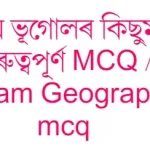The Assam Direct Recruitment 2022 exam is a significant opportunity for job seekers in Assam. Understanding the syllabus is crucial for effective preparation.
Advertisements
Overview of Assam Direct Recruitment 2022 Syllabus
The syllabus for the Assam Direct Recruitment 2022 exam includes various subjects that candidates need to study. The subjects are divided into sections, each covering different topics. Here, we will break down the syllabus into its main components.
General Knowledge
The General Knowledge section tests candidates’ awareness of the world around them. This includes current events, important dates, and basic general knowledge.
Advertisements
Topics Covered:
- Current Affairs
- History
- Geography
- Indian Polity
- Economy
- Sports
- Important Days and Dates
General English
The General English section evaluates the candidates’ proficiency in English language skills. This includes grammar, vocabulary, comprehension, and other language-related topics.
Topics Covered:
- Grammar
- Vocabulary
- Comprehension
- Sentence Structure
- Synonyms and Antonyms
- Idioms and Phrases
Advertisements
Reasoning
The Reasoning section assesses candidates’ logical thinking and problem-solving abilities. This includes both verbal and non-verbal reasoning.
Topics Covered:
- Analogies
- Classification
- Series
- Coding-Decoding
- Blood Relations
- Direction Sense Test
- Logical Venn Diagrams
- Alphabet Test
- Ranking and Order
Mathematics
The Mathematics section tests candidates’ numerical ability and mathematical skills. The topics range from basic arithmetic to more complex mathematical concepts.
Topics Covered:
- Number System
- Simplification
- Decimal and Fractions
- Ratio and Proportion
- Percentages
- Average
- Profit and Loss
- Simple and Compound Interest
- Time and Work
- Time and Distance
- Mensuration
- Data Interpretation
Computer Knowledge
The Computer Knowledge section evaluates the candidates’ understanding of basic computer concepts and applications. This includes knowledge of hardware, software, and basic troubleshooting.
Topics Covered:
- Computer Fundamentals
- Operating Systems
- MS Office (Word, Excel, PowerPoint)
- Internet and Email
- Basic Troubleshooting
- Keyboard Shortcuts
Assamese Language
The Assamese Language section tests the candidates’ proficiency in the Assamese language. This includes grammar, vocabulary, and comprehension.
Topics Covered:
- Grammar
- Vocabulary
- Comprehension
- Sentence Structure
- Synonyms and Antonyms
- Idioms and Phrases
Syllabus Details in Table Format
To provide a clear understanding of the syllabus, here is a table summarizing the topics covered in each section:
| Section | Topics Covered |
|---|---|
| General Knowledge | Current Affairs, History, Geography, Indian Polity, Economy, Sports, Important Days and Dates |
| General English | Grammar, Vocabulary, Comprehension, Sentence Structure, Synonyms and Antonyms, Idioms and Phrases |
| Reasoning | Analogies, Classification, Series, Coding-Decoding, Blood Relations, Direction Sense Test, Logical Venn Diagrams, Alphabet Test, Ranking and Order |
| Mathematics | Number System, Simplification, Decimal and Fractions, Ratio and Proportion, Percentages, Average, Profit and Loss, Simple and Compound Interest, Time and Work, Time and Distance, Mensuration, Data Interpretation |
| Computer Knowledge | Computer Fundamentals, Operating Systems, MS Office (Word, Excel, PowerPoint), Internet and Email, Basic Troubleshooting, Keyboard Shortcuts |
| Assamese Language | Grammar, Vocabulary, Comprehension, Sentence Structure, Synonyms and Antonyms, Idioms and Phrases |
Tips for Preparing Each Section
General Knowledge
- Stay updated with current events by reading newspapers and watching news channels.
- Refer to general knowledge books and online resources.
- Make notes of important dates and events.
General English
- Improve grammar skills by practicing exercises from grammar books.
- Enhance vocabulary by learning new words daily.
- Practice reading comprehension passages and answering questions.
Reasoning
- Solve puzzles and practice reasoning questions from previous exams.
- Focus on understanding the logic behind each type of question.
- Take online mock tests to improve speed and accuracy.
Mathematics
- Practice basic arithmetic operations regularly.
- Solve previous years’ question papers to understand the types of questions asked.
- Focus on time management while solving mathematical problems.
Computer Knowledge
- Learn basic computer concepts and applications.
- Practice using MS Office tools like Word, Excel, and PowerPoint.
- Stay updated with the latest developments in computer technology.
Assamese Language
- Practice reading and writing in Assamese regularly.
- Enhance vocabulary by learning new words and phrases.
- Solve previous years’ question papers to understand the pattern and types of questions asked.
Detailed Syllabus Breakdown
General Knowledge:
- Current Affairs: National and international events, important government schemes, and recent scientific developments.
- History: Indian history from ancient to modern times, freedom struggle, and significant historical events.
- Geography: Physical geography, Indian geography, and world geography.
- Indian Polity: Constitution of India, political system, Panchayati Raj, and public administration.
- Economy: Basic economic concepts, Indian economy, and economic policies.
- Sports: Important sports events, personalities, and achievements.
- Important Days and Dates: National and international important days, festivals, and observances.
General English:
- Grammar: Parts of speech, tenses, subject-verb agreement, articles, prepositions, and conjunctions.
- Vocabulary: Word meanings, synonyms, antonyms, and homophones.
- Comprehension: Reading passages and answering questions based on the content.
- Sentence Structure: Correcting sentence structure and identifying errors.
- Synonyms and Antonyms: Finding words with similar and opposite meanings.
- Idioms and Phrases: Commonly used idioms and phrases and their meanings.
Reasoning:
- Analogies: Identifying relationships between pairs of words or numbers.
- Classification: Grouping items based on common characteristics.
- Series: Completing number or letter series based on patterns.
- Coding-Decoding: Deciphering codes based on given rules.
- Blood Relations: Solving problems based on family relationships.
- Direction Sense Test: Determining directions and distances based on given information.
- Logical Venn Diagrams: Solving problems using Venn diagrams.
- Alphabet Test: Solving problems based on the alphabetical order.
- Ranking and Order: Determining the rank or order of individuals based on given criteria.
Mathematics:
- Number System: Understanding whole numbers, integers, fractions, and decimals.
- Simplification: Solving mathematical expressions using BODMAS rules.
- Decimal and Fractions: Converting and comparing decimals and fractions.
- Ratio and Proportion: Understanding and solving ratio and proportion problems.
- Percentages: Calculating percentages and solving percentage-related problems.
- Average: Finding the average of a set of numbers.
- Profit and Loss: Calculating profit, loss, and percentage profit or loss.
- Simple and Compound Interest: Calculating interest using simple and compound interest formulas.
- Time and Work: Solving problems related to work and time taken to complete it.
- Time and Distance: Calculating speed, distance, and time in motion problems.
- Mensuration: Finding the area, perimeter, and volume of geometric shapes.
- Data Interpretation: Analyzing and interpreting data from tables, graphs, and charts.
Computer Knowledge:
- Computer Fundamentals: Understanding the basic components and functions of a computer.
- Operating Systems: Knowledge of different operating systems like Windows, Linux, and macOS.
- MS Office: Using MS Word, Excel, and PowerPoint for creating documents, spreadsheets, and presentations.
- Internet and Email: Browsing the internet, using search engines, and managing emails.
- Basic Troubleshooting: Identifying and solving common computer problems.
- Keyboard Shortcuts: Learning important keyboard shortcuts for efficient computer use.
Assamese Language:
- Grammar: Understanding parts of speech, sentence structure, and tenses in Assamese.
- Vocabulary: Learning new words, synonyms, and antonyms in Assamese.
- Comprehension: Reading passages in Assamese and answering questions based on the content.
- Sentence Structure: Correcting sentence structure and identifying errors in Assamese.
- Synonyms and Antonyms: Finding Assamese words with similar and opposite meanings.
- Idioms and Phrases: Learning commonly used idioms and phrases in Assamese and their meanings.
Preparation Resources
For effective preparation, candidates can refer to the following resources:
- Books: Standard textbooks and guides for each subject.
- Online Resources: Educational websites, online courses, and YouTube channels.
- Previous Year Question Papers: Solving past papers to understand the exam pattern and types of questions asked.
- Mock Tests: Taking online mock tests to practice time management and improve accuracy.
Understanding the syllabus for the Assam Direct Recruitment 2022 exam is essential for effective preparation. By focusing on each section and using the resources mentioned, candidates can improve their chances of success. Remember to practice regularly, stay updated with current events, and manage your time efficiently while preparing for the exam.
Latest Posts
- Step-by-step guide to download and apply for jee mains admit card 202
- Comprehensive 2025 government holidays and recruitment details for job seekers
- JEE Mains Admit Card 2025: Your Step-by-Step Guide to Downloading the Hall Ticket
- Everything You Need to Know About 2025 Government Holidays Recruitment
- Comprehensive Guide to rrb d group recruitment 2025 – Eligibility, Vacancies, and Application
- Detailed guide to nps trust recruitment 2025 vacancies, eligibility and apply process
- Comprehensive guide to hpcl recruitment 2025 notification, vacancies, and application process
- ignou bed admission 2025 complete recruitment guide with eligibility and process
- Comprehensive Guide to Indian Army Agniveer Recruitment 2025 Notification and Jobs
- Everything You Must Know About CBSE Board Exams 2025 Changes & New Rules





